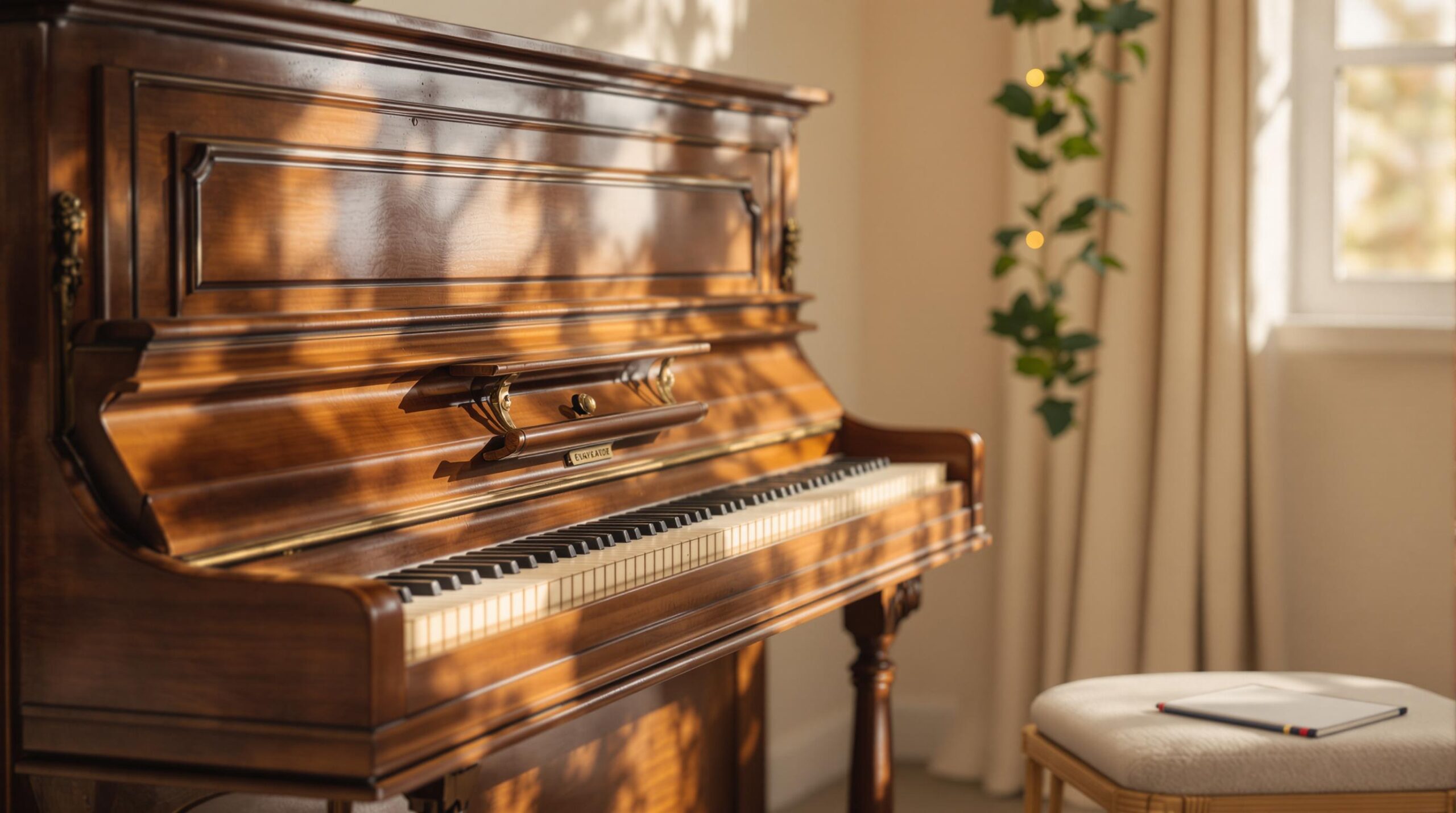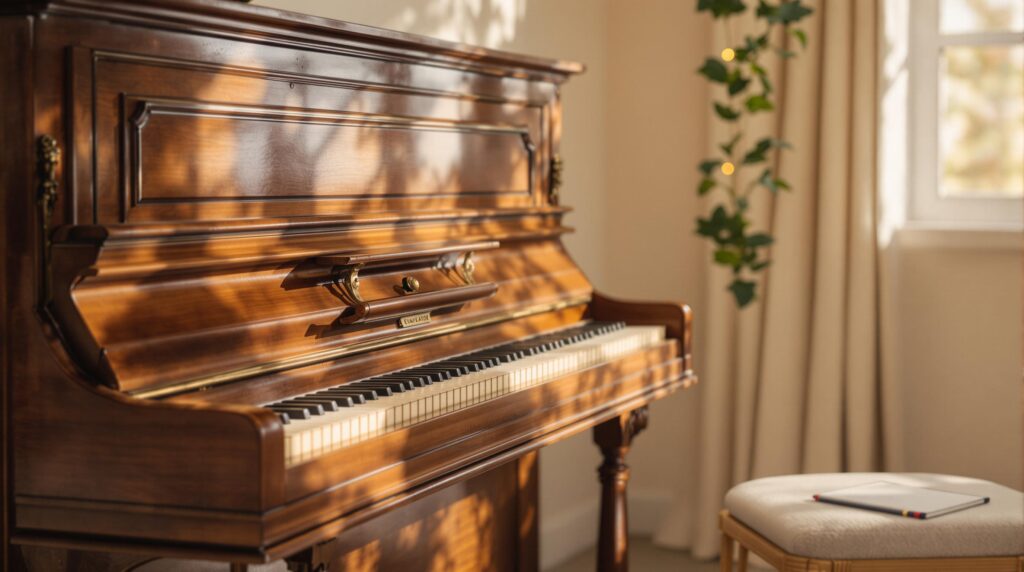
Determining a used piano’s value involves several key factors that impact its worth. Here’s what you need to know:
- Brand and Model: Premium brands like Steinway & Sons retain more value compared to mass-produced brands like Yamaha or Kawai.
- Age and Condition: Older pianos generally lose value unless well-maintained or restored. Pre-WWII pianos often have low resale value unless they’re rare or antique.
- Type and Size: Grand pianos typically hold higher value than uprights, with prices ranging from $500 to $90,000 depending on quality.
- Restoration Work: Proper restoration can significantly increase a piano’s value, especially for antique or high-quality instruments.
- Local Market Trends: Regional demand, supply, and economic conditions heavily influence pricing.
Quick Tips:
- Inspect the piano for soundboard cracks, string condition, and smooth key action.
- Use online tools like PianoMart.com or hire a professional appraiser for accurate valuation.
- Consider unique factors like historical or celebrity ownership for added value.
A thorough inspection and market research are crucial to avoid overpaying or underselling. Let’s dive deeper into each factor.
How to Value Piano – Guide For Buying Used Piano
Main Value Factors
These elements provide a foundation for assessing a piano’s worth before diving into a detailed inspection and pricing research.
Brand and Model
The brand plays a big role in resale value. Historically, there were over 1,000 piano manufacturers, but today, Steinway & Sons stands as the only major American maker still in operation [1].
Here’s how brands stack up in terms of value retention:
Steinway & Sons:
- 5–10 years old: Retains 80% of its original value ($60,000–$90,000)
- 10–20 years old: Holds 60–70% of its original value ($45,000–$70,000)
- 20–30 years old: Maintains 50% of its original value ($40,000–$60,000) [1]
Other Manufacturers:
- Yamaha, Kawai, and Samick (10–20 years old): $2,000–$20,000
- European brands (5–20 years old): $10,000–$50,000 [1]
Age and Condition
"Age does not make a piano worth more; it makes it worth less" [1]
The piano’s condition often matters more than its age or brand. Over time, materials naturally wear down, impacting the value.
Value by Age:
- Pre-WWII uprights: Typically free to $500 (rare pieces may reach $1,000)
- Pre-WWII grands: $500–$3,000
- 1940–1970 uprights: Free to $500
- 1940–1970 grands: $2,000–$6,000 [3]
Pianos that are well-maintained tend to hold 50%–80% of their original value [3]. While mass-produced pianos generally last around 50–65 years, top-quality handmade instruments can surpass 70 years [2].
Piano Types and Sizes
The type and size of a piano also influence its resale value in the used market:
| Piano Type | Used Price Range |
|---|---|
| Upright | $500–$10,000+ |
| Entry-level Grand | $3,000–$6,000 |
| Mid-range Grand | $15,000–$25,000 |
Grand pianos generally hold higher value due to their superior sound and touch responsiveness [4]. On the other hand, digital pianos provide modern features like volume control and headphone outputs, making them a more budget-friendly option [4].
Next, we’ll explore how to evaluate these factors during an in-person inspection.
Physical Inspection Guide
A detailed physical inspection is key to understanding a piano’s actual value. It can uncover hidden issues that might lower its worth or lead to expensive repairs.
Checking Sound Components
The soundboard and strings play a major role in a piano’s sound quality and overall value. Here’s what to look for:
Soundboard Assessment:
- Gently pluck individual strings and listen for clear, sustained tones – this is known as the "Pluck Test" [5].
- Inspect the soundboard for cracks. A few small ones are normal, but large or unrepaired cracks can drastically lower the piano’s value [5].
- Check that the soundboard is firmly attached around its edges.
- Play each key and listen for buzzing or rattling, which might mean loose parts.
String Condition:
- Light surface rust is acceptable, but heavy corrosion increases the risk of string breakage [5].
- Ensure all strings are present and correctly aligned.
- Pay special attention to bass notes – they should sound deep and sustained, not short or dull [5].
Testing Keys and Action
The action mechanism impacts how the piano feels to play, so a careful check is essential:
| Test Type | What to Check | Warning Signs |
|---|---|---|
| Evenness | Volume consistency across keys | Uneven sound levels |
| Control | Key resistance and movement | Sticky or loose keys |
| Repetition | Speed of repeated notes | Slow or inconsistent response |
| Touch Weight | Pressure needed to press keys | Keys feel too heavy or light |
"When you play music you discover a part of yourself that you never knew existed." – Bill Evans [7]
Play each key to ensure the tone is consistent and the mechanism operates smoothly. A well-functioning action should allow for controlled, fluid playing without too much resistance [7]. Once you’ve checked the keys, move on to the pedals.
Examining Pedals and Features
After evaluating the keys and action, focus on the pedals to complete your inspection:
Standard Pedal Check:
- Make sure pedals engage smoothly without squeaking or sticking [2].
- Look for signs of heavy wear, like flat spots on the pedals [8].
- On grand pianos, ensure the pedal lyre is securely attached [5].
Special Features:
- Test the sostenuto (middle) pedal to confirm it works properly [5].
- On grand pianos, verify the left pedal shifts the keyboard instead of just affecting the bass dampers [5].
- If the piano has a player system, check all electronic components for proper functioning [2].
"The pedals need to be checked too, creaking or squeaking pedals might be an indication that there are internal mechanisms problems." – Broughton Pianos [8]
Issues with pedals or other components can lead to costly repairs, sometimes running into thousands of dollars [6]. For a thorough evaluation, it’s a good idea to hire a professional piano technician before making a purchase [2].
sbb-itb-b8bc1ab
Price Research Methods
Once you’ve thoroughly inspected the piano, the next step is determining its market value. To do this, use a mix of online tools, professional appraisals, and local market research. These resources can give you a clearer picture of fair pricing for used pianos.
Online Price Tools
PianoMart.com, a well-known platform since January 1997, is a great starting point for researching used piano prices [9]. It allows you to:
- Compare similar models in your area
- Review historical price trends
- Browse verified seller listings
- Check detailed specifications and conditions
Focus on pianos that match your piano’s brand, model, age, condition, location, and restoration history for the most accurate comparison.
Professional Appraisal Services
For antique or high-value pianos, professional appraisals are essential. Here’s a breakdown of common appraisal options:
| Service Type | Cost Range | Turnaround Time | Best For |
|---|---|---|---|
| Online Valuation | $35–$40 | 24–48 hours | Quick initial estimates |
| On-site Appraisal | $450–$550 | 1–2 weeks | Tax or insurance documentation |
| Celebrity Piano Appraisal | $950+ | Custom | Historical or notable pieces |
"Acting in the capacity of appraiser, we accurately and expertly appraise vintage and antique pianos in strict compliance with the principles of appraisal practice and code of ethics of the Association of Online Appraisers." – Piano Appraisal, LLC [10]
Professional appraisers take into account factors like depreciation, rarity, design, and even the furniture value of the piano [11]. For tax deductions or insurance claims, ensure you get written documentation from a certified appraiser [12]. Pair these insights with your market research for a well-rounded valuation.
Local businesses can also be a solid option. For instance, Cooper Piano, a trusted name for over 100 years, offers certified appraisal services along with tuning, repair, and restoration. Their industry expertise can provide additional clarity on your piano’s worth.
Local Market Analysis
Prices for pianos often vary by region, influenced by local demand, market saturation, and economic conditions. Here’s a general guide to current market values for popular brands [1]:
- Steinway & Sons (under 40 years): $40,000 to $90,000
- Yamaha, Kawai, or Samick (10–20 years): $2,000 to $20,000
- European makes (5–20 years): $10,000 to $50,000
To get a better understanding of your local market, consider:
- Recent sales of comparable pianos
- Local inventory and demand trends
- Transportation costs
- Regional economic factors
Special Value Elements
Certain factors beyond condition and market trends can increase a piano’s worth significantly.
Restoration and Age Value
Pianos made before 1930 are often considered antiques and can fetch high prices if professionally restored. Here’s a breakdown of how restoration affects their value:
| Piano Type | Year Range | As-Is Price | Restored Price |
|---|---|---|---|
| Grand Piano | 1880–1900 | $1,500 – $3,500 | $40,000 – $75,000 |
| Square Grand Piano | 1840–1890 | – | $4,500 – $8,500* |
| Upright Piano | 1880–1900 | $400 – $1,100 | – |
| Player Piano | 1905–1930 | – | $25,000 – $35,000+ |
*In average to good original condition
Michael Stinnett, Founder of Antique Piano Shop, Inc., emphasizes the growing interest in antique piano restoration:
"The real market has historically supported antique piano restoration and preservation, and this trend is growing" [15]
Restoration, which starts at $2,500, not only enhances the value but also preserves history [16]. Many older pianos are known for their exceptional materials and craftsmanship. As Texas Piano Restoration explains:
"Restoring an old piano can preserve a piece of history… Restoring an old piano can bring back the beauty and elegance of a bygone era" [13]
Famous Ownership History
A piano’s provenance can significantly influence its market value. Celebrity ownership, in particular, can make a piano highly sought after. For example, Freddie Mercury’s Yamaha baby grand piano sold for £1.74 million at a 2023 auction, breaking the record for piano prices [14].
"Ownership is much more important than just having played or practised on an instrument. Freddie Mercury would have played on hundreds of pianos, but he owned the Yamaha on which he composed some of the greatest songs of the 20th century" [14]
Other high-profile sales, including pianos owned by John Lennon, highlight how celebrity connections can drive up value. Experts like Cooper Piano (https://cooperpiano.com) can help assess the worth of instruments with such notable histories.
Summary and Next Steps
As outlined earlier, conducting a detailed inspection and thorough market research is crucial. A professional appraisal by a certified technician usually costs between $100 and $200 [17]. Here’s how you can ensure an accurate valuation:
-
Get a Professional Assessment
Hire a technician to inspect your piano. Certified professionals, like those at Cooper Piano, provide in-depth evaluations, factoring in brand reputation, age, condition, and market trends. -
Document Your Research
Gather appraisal reports, comparable listings, market data, and restoration estimates. These details will be essential for negotiations.
Once you have your appraisal and research ready:
- Evaluate Your Options
Based on the appraisal, decide whether to buy, sell, restore, trade, or consign your piano.
"Barrett E. Lowery notes: These guys (and gals) are true professionals. Had a baby grand I needed moved which had lots of sentimental value. There was never a doubt that Cooper Piano was going to be able to move and set up the piano at its new home in the same condition it left its previous home. Highly recommend." [18]

